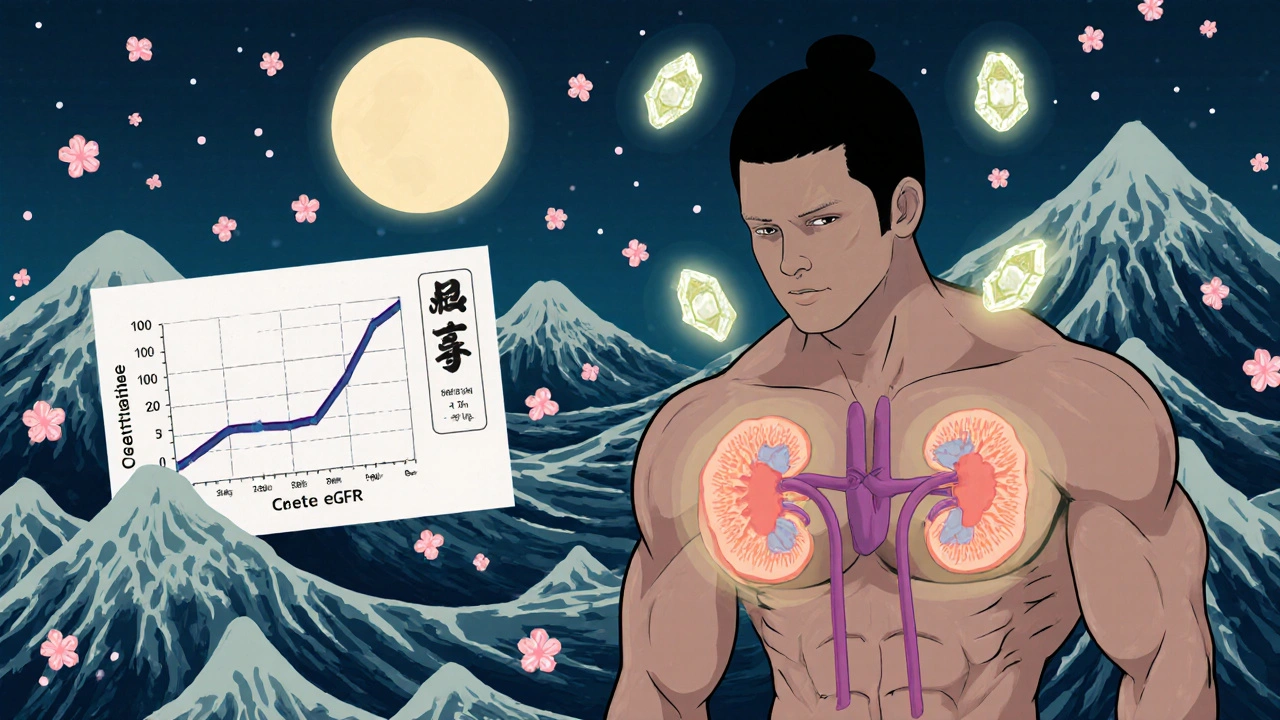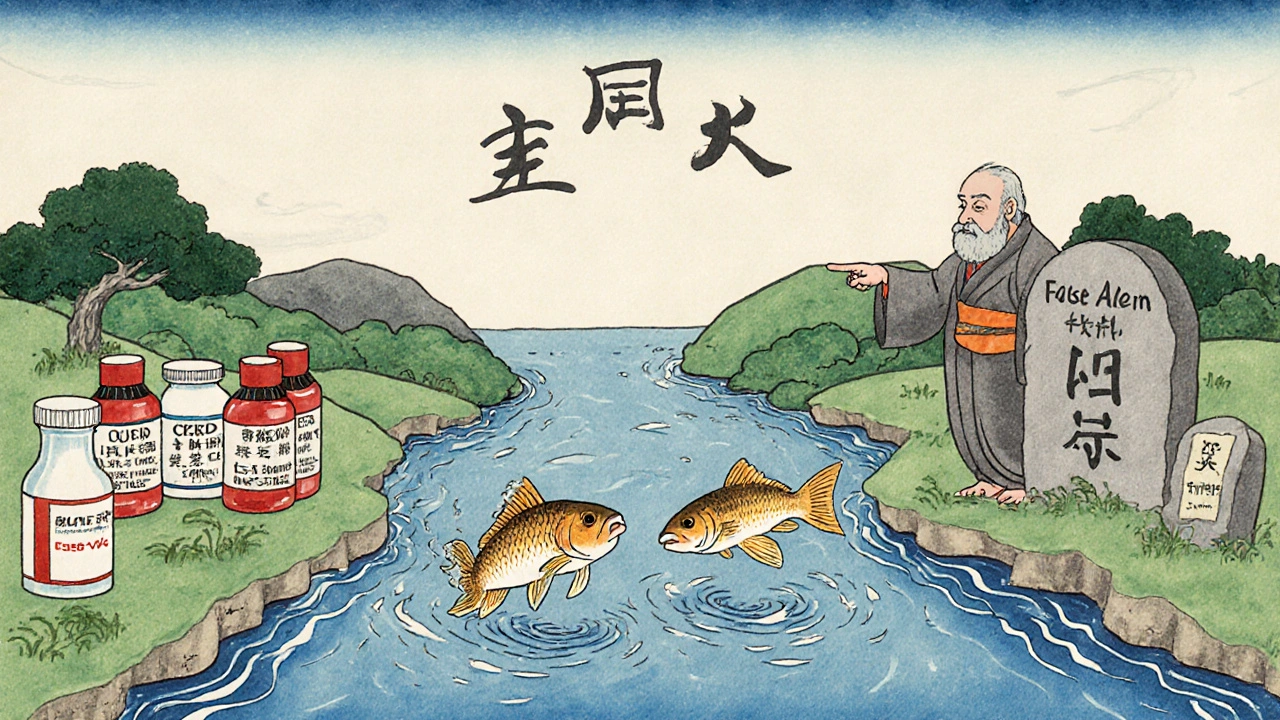
Creatine Effect Calculator for Kidney Function
How Creatine Affects Your Lab Results
Creatine supplements increase serum creatinine by 15-25 µmol/L, which can falsely lower your eGFR. This tool shows how creatine affects your kidney function results and why cystatin C is a better monitoring tool.
Your Current Lab Values
When you take creatine to build strength or recover faster, you’re not just boosting your workouts-you’re also changing how your kidneys show up on lab tests. That’s not a myth. It’s science. And if you’re on kidney disease medications like ACE inhibitors, diuretics, or NSAIDs, this change can trigger false alarms that lead to unnecessary stress, extra tests, or even wrong diagnoses.
Why Creatine Throws Off Kidney Lab Results
Creatine monohydrate breaks down in your body into creatinine, a waste product your kidneys filter out. That’s why doctors use serum creatinine levels to estimate how well your kidneys are working-through a number called eGFR. But here’s the problem: when you take creatine, your creatinine levels rise even if your kidneys are perfectly healthy. Studies show that taking the standard dose-5 grams a day-can bump up your serum creatinine by 15 to 25 µmol/L. That’s enough to make your eGFR drop from 90 to 75, which looks like stage 2 chronic kidney disease. But it’s not disease. It’s a lab artifact. Your kidneys are still doing their job. You’re just flooding the system with more creatinine because you’re giving your body extra creatine. This isn’t just a theoretical issue. On Reddit, users report being wrongly told they have kidney disease after starting creatine. One person got an eGFR of 78 and was told they had CKD. After stopping creatine for a month, their eGFR jumped back to 95. No treatment. No change in diet. Just quitting the supplement.What Happens When You Combine Creatine With Kidney Medications
If you’re on medication for kidney disease, you’re already walking a tightrope. Drugs like lisinopril, furosemide, or ibuprofen can stress your kidneys. Add creatine into the mix, and the risk isn’t necessarily that creatine harms your kidneys-it’s that you can’t tell what’s really going on. Doctors rely on creatinine to adjust your meds. If your creatinine is high because of creatine, they might think your kidneys are worsening and reduce your dose or switch you to something stronger. That could make your condition worse, not better. The good news? Multiple large studies-including a 2024 Mendelian randomization analysis published in Renal Failure-show no causal link between creatine and kidney damage. In fact, creatine levels had zero meaningful effect on kidney function markers. But that doesn’t mean you should ignore the interaction.What You Need to Know About Cystatin C
There’s a better way to check kidney function if you take creatine: cystatin C. Unlike creatinine, cystatin C isn’t affected by muscle mass, diet, or supplements. It’s a more accurate marker of actual glomerular filtration rate. When researchers compared creatinine-based eGFR with cystatin C-based eGFR in people taking creatine, the creatinine numbers were all over the place-but cystatin C stayed steady. The National Kidney Foundation recommends using the CKD-EPI CysC equation for anyone taking creatine. If your clinic doesn’t offer cystatin C testing, ask for it. It’s not expensive. It’s not experimental. It’s just not widely known. A 2020 study in the Clinical Journal of the American Society of Nephrology found cystatin C-based eGFR matched true kidney function with 95% accuracy in creatine users. That’s better than creatinine ever was.
What to Do Before Starting Creatine
If you have kidney disease or are on kidney-related meds, don’t just start taking creatine. Do this first:- Get a baseline creatinine and cystatin C test.
- Ask your doctor to calculate your eGFR using both creatinine and cystatin C.
- Document your results and keep a copy.
- Tell your doctor you plan to take creatine and why.
- Set a plan for follow-up testing every 3-6 months.
What Your Doctor Should Be Asking
A 2021 study in American Family Physician found that 67% of primary care doctors don’t ask patients about supplement use when they see elevated creatinine. That’s a huge gap. If your doctor sees your creatinine is high and doesn’t ask if you’re taking creatine, they’re missing a key piece of the puzzle. Don’t wait for them to ask. Bring it up. Say: “I’m taking creatine. Could this be affecting my lab results?” Some clinics now include a checkbox for “dietary supplements” on intake forms. If yours doesn’t, write it in. Creatine isn’t a drug. But it’s not harmless either. It changes your biology. You deserve to be understood.What About ‘Kidney-Safe’ Creatine Products?
You’ll see ads for creatine labeled “kidney-friendly,” “renal-safe,” or “low-creatinine.” These are marketing gimmicks. There’s no such thing as creatine that doesn’t turn into creatinine. All forms of creatine-monohydrate, HCl, nitrate, buffered-break down the same way in your body. ConsumerLab.com tested over 20 creatine products in 2024. None of them had lower creatinine output. The “special” formulas cost more. They don’t work better. Stick with plain creatine monohydrate. It’s the most studied, cheapest, and most reliable form.
When to Stop Creatine
There’s one clear reason to stop: if your doctor finds real signs of kidney damage. That means:- High blood urea nitrogen (BUN) alongside high creatinine
- Protein in your urine (proteinuria)
- Abnormal electrolytes (like high potassium or low sodium)
- Signs of fluid retention or swelling
What’s Coming Next
Researchers are working on a simple fix: a correction factor for creatinine when you’re on creatine. Early data from the University of Toronto suggests multiplying your creatinine result by 0.9 to get a more accurate eGFR. That’s not official yet-but it’s coming. The National Kidney Foundation is expected to release updated guidelines in late 2024 that will include specific advice for creatine users. Until then, the best tool you have is knowledge. Know your numbers. Know your meds. Know your supplements. And don’t let a lab result scare you into stopping something that helps you feel stronger, recover faster, and live better.Does creatine damage your kidneys if you have kidney disease?
No, creatine doesn’t damage kidneys in people with kidney disease when taken at standard doses. However, it can make lab results look worse by raising creatinine levels, which may lead to misinterpretation. If you have kidney disease, always check with your nephrologist before starting creatine, and use cystatin C instead of creatinine to monitor your kidney function.
Can I still take creatine if I’m on ACE inhibitors or diuretics?
Yes, but you need to monitor your kidney function more carefully. ACE inhibitors and diuretics affect how your kidneys handle fluids and waste. Creatine adds another variable. The safest approach is to get a baseline cystatin C test before starting creatine, and repeat it every 3-6 months. If your cystatin C stays stable, your kidneys are fine-even if your creatinine rises.
Why does my doctor keep ordering more kidney tests after I started creatine?
Your creatinine level went up, and your doctor doesn’t know you’re taking creatine. Most primary care providers aren’t trained to recognize supplement interference. Bring your lab results and tell them you’re using creatine. Ask if they’ve checked cystatin C. Many will be surprised to learn it’s a better option-and will stop ordering unnecessary tests once they understand the issue.
Is there a type of creatine that doesn’t raise creatinine?
No. All forms of creatine-monohydrate, HCl, nitrate, buffered-break down into creatinine in your body. Products marketed as “kidney-safe” or “low-creatinine” are not scientifically supported. Stick with plain creatine monohydrate. It’s cheaper, better studied, and just as effective.
How often should I get my kidney function checked if I take creatine?
If you’re healthy and not on kidney meds, check creatinine once a year. If you have kidney disease or take nephrotoxic medications, check both creatinine and cystatin C every 3-6 months. Always compare results to your baseline, not just to the lab’s reference range.
Next Steps for Safe Use
If you’re taking creatine and kidney meds:- Get a cystatin C test now if you haven’t already.
- Share your creatine use with your doctor in writing-don’t just mention it in passing.
- Keep a log of your supplement dose and lab results.
- Ask for the CKD-EPI CysC eGFR calculation on your reports.
- Stop creatine only if real signs of kidney damage appear-high BUN, protein in urine, or electrolyte issues.
So creatine doesn't wreck kidneys but messes with the labs? That's wild. I've seen people panic over eGFR drops like it's a death sentence. Meanwhile their kidneys are fine and they're just supplementing. This is why medicine needs better biomarkers. Cystatin C should be standard, not the afterthought it is.
Excellent breakdown. The 2024 Mendelian randomization study is particularly compelling-it eliminates confounding variables far better than observational data. The fact that cystatin C remains unaffected by creatine supplementation makes it the gold standard for monitoring renal function in athletes and patients alike. I urge all clinicians to adopt the CKD-EPI CysC equation routinely, especially in populations with high supplement use.
Just started creatine last month. My doc didn't ask about supplements. Got a scary eGFR drop. I asked about cystatin C. They didn't know what it was. Now I'm waiting for a repeat test. This post saved me from unnecessary stress. Thanks.
So we're told to trust science but then doctors ignore it because they don't know the science? That's not hypocrisy that's just the system. Creatine isn't the problem. The problem is we treat numbers like truth instead of clues. The body doesn't care about eGFR. It cares about how you feel. If you're strong and not swelling then your kidneys are fine. The lab is just a mirror. Sometimes it's fogged
This is so important!! 😊 I’ve been taking creatine for years with stage 2 CKD and my nephrologist actually knew about cystatin C! She’s the best. If you’re on meds or have kidney issues, don’t be shy-speak up! You’re not being annoying, you’re being smart 💪❤️
My doc said my creatinine was high and I was in danger… I told him I take creatine and he just shrugged… I asked for cystatin C and he said ‘oh that’s not covered’… I paid out of pocket. My results were normal. The system fails people who don’t know to ask. You’re not paranoid. You’re prepared 🌱
Why are you wasting time on supplements? In India we eat dal and roti and live to 90. No fancy powders needed. This is western nonsense. Your kidneys are not weak because of creatine. They are weak because you eat too much meat and sit too much. Stop listening to American gurus and go back to real food
Wait so creatine turns into creatinine? So if i take 10g instead of 5g my creatinine goes up more? But what if i take it with lemon water? Does that help? I read on a forum that vitamin C reduces creatinine? Is that true? Also my lab said my creatinine was 1.4 but my friend says that’s normal for him? So who do i believe? I’m confused